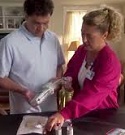

How to self-administer Hizentra
Hizentra is a subcutaneous immunoglobulin, or SCIg, which means it is infused in the fatty layer located just under the skin, and NOT in a vein. Before you can infuse Hizentra yourself, it is important that you receive proper training from your healthcare professional. There are also several resources available here to help you and your doctor make sure you’re comfortable with the self-infusion process.
Watch the instruction video here or download the self-administration guide to review the step-by-step instructions on preparation, proper infusion techniques, and administration.
Demonstration Videos
SPECIFICATIONS
What is Hizentra?
Hizentra subcutaneous (for injection under the skin) is used to treat primary immunodeficiency (PI) This includes, but is not limited to, the humoral immune defect in congenital agammaglobulinemia, common variable immunodeficiency, X-linked agammaglobulinemia, Wiskott-Aldrich syndrome, and severe combined immunodeficiencies.
Hizentra may also be used for purposes not listed in this medication guide.
Important information
You should not use Hizentra subcutaneous if you have a condition called hyperprolinemia (high level of a certain amino acid in the blood).
Hizentra can cause blood clots. A blood clot may be more likely if you have risk factors such as heart disease, blood circulation problems, estrogen use, a history of blood clots, if you are 65 years or older, if you have been bed-ridden, or if you are using a catheter.
Stop using Hizentra and call your doctor at once if you have:
- signs of a blood clot in the brain–sudden numbness or weakness (especially on one side of the body), slurred speech, problems with vision or balance;
- signs of a blood clot in the heart or lung–chest pain, rapid heart rate, sudden cough, wheezing, rapid breathing, coughing up blood; or
- signs of a blood clot in your leg–pain, swelling, warmth, or redness in one or both legs.
Hizentra can also harm your kidneys, especially if you already have kidney disease or if you also use certain other medicines. Many other drugs (including some over-the-counter medicines) can be harmful to the kidneys.
Call your doctor at once if you have signs of a kidney problem, such as swelling, rapid weight gain, and little or no urinating.
Drink plenty of liquids while you are using Hizentra to help improve your blood flow and keep your kidneys working properly.
Before using Hizentra
You should not use Hizentra if you have ever had an allergic reaction to an immune globulin, or if you have:
- immune globulin A (IgA) deficiency with antibody to IgA; or
- a condition called hyperprolinemia (high level of a certain amino acid in the blood).
Hizentra can harm your kidneys or cause blood clots. To make sure this medicine is safe for you, tell your doctor if you have:
- heart disease, blood circulation problems or a blood vessel disorder;
- a history of stroke or blood clot;
- if you use estrogens (birth control pills or hormone replacement therapy);
- kidney disease;
- diabetes;
- if you are dehydrated;
- if you are 65 years or older;
- if you have been bed-ridden due to severe illness; or
- if you are using a catheter.
USER MANUAL
How to start Subcutaneous injections.
FREQUENTLY ASKED QUESTIONS
Important Safety Information
WARNING: Thrombosis (blood clots) can occur with immune globulin products, including Hizentra. Risk factors can include: advanced age, prolonged immobilization, a history of blood clotting or hyperviscosity (blood thickness), use of estrogens, installed vascular catheters, and cardiovascular risk factors.
If you are at high risk of blood clots, your doctor will prescribe Hizentra at the minimum dose and infusion rate practicable and will monitor for signs of clotting events and hyperviscosity. Always drink sufficient fluids before infusing Hizentra.
See your doctor for a full explanation, and the full prescribing information for complete boxed warning.
Hizentra®, Immune Globulin Subcutaneous (Human), 20% Liquid, is a prescription medicine used to treat:
- Primary immune deficiency (PI) in patients 2 years and older
- Chronic inflammatory demyelinating polyneuropathy (CIDP) in adults
Treatment with Hizentra might not be possible if your doctor determines you have hyperprolinemia (too much proline in the blood), or are IgA-deficient with antibodies to IgA and a history of hypersensitivity. Tell your doctor if you have previously had a severe allergic reaction (including anaphylaxis) to the administration of human immune globulin. Tell your doctor right away or go to the emergency room if you have hives, trouble breathing, wheezing, dizziness, or fainting. These could be signs of a bad allergic reaction.
Inform your doctor of any medications you are taking, as well as any medical conditions you may have had, especially if you have a history of diseases related to the heart or blood vessels, or have been immobile for some time. Inform your physician if you are pregnant or nursing, or plan to become pregnant.
Infuse Hizentra under your skin only; do not inject into a blood vessel. Self-administer Hizentra only after having been taught to do so by your doctor or other healthcare professional, and having received dosing instructions for treating your condition.
Immediately report to your physician any of the following symptoms, which could be signs of serious adverse reactions to Hizentra:
- Reduced urination, sudden weight gain, or swelling in your legs (possible signs of a kidney problem).
- Pain and/or swelling or discoloration of an arm or leg, unexplained shortness of breath, chest pain or discomfort that worsens on deep breathing, unexplained rapid pulse, or numbness/weakness on one side of the body (possible signs of a blood clot).
- Bad headache with nausea; vomiting; stiff neck; fever; and sensitivity to light (possible signs of meningitis).
- Brown or red urine; rapid heart rate; yellowing of the skin or eyes; chest pains or breathing trouble; fever over 100°F (possible symptoms of other conditions that require prompt treatment).
Hizentra is made from human blood. The risk of transmission of infectious agents, including viruses and, theoretically, the Creutzfeldt-Jakob disease (CJD) agent and its variant (vCJD), cannot be completely eliminated.
The most common side effects in the clinical trials for Hizentra include redness, swelling, itching, and/or bruising at the infusion site; headache; chest, joint or back pain; diarrhea; tiredness; cough; rash; itching; fever, nausea, and vomiting. These are not the only side effects possible. Tell your doctor about any side effect that bothers you or does not go away.
Before receiving any vaccine, tell immunizing physician if you have had recent therapy with Hizentra, as effectiveness of the vaccine could be compromised.
Please see full prescribing information for Hizentra, including boxed warning and the patient product information.
You are encouraged to report negative side effects of prescription drugs to the FDA. Visit www.fda.gov/medwatch, or call 1-800-FDA-1088.
RELATED ITEMS
The Perfusor Space 2nd Generation Syringe Pump
The Perfusor® Space 2nd Generation Syringe Pump The Read more...
SCIg60 Infuser System
SCIg60 Pump The SCIg60 Infuser is a mechanical Read more...
How to self-administer Hizentra Instructions
How to self-administer Hizentra Hizentra is a Read more...
Crono Super-PID subcutaneous pump Instructions
Crono Super PID Ambulatory Syringe Infusion Pump Read more...
Subcutaneous Injections Instructions
What is a subcutaneous injection? A subcutaneous Read more...
Pediatric Subcutaneous (sub-Q) Injection
Pediatric Subcutaneous Injections Subcutaneous injections can be Read more...
Crono Five – Subcutaneous Pump
Crono Five is an ambulatory infusion pump Read more...

